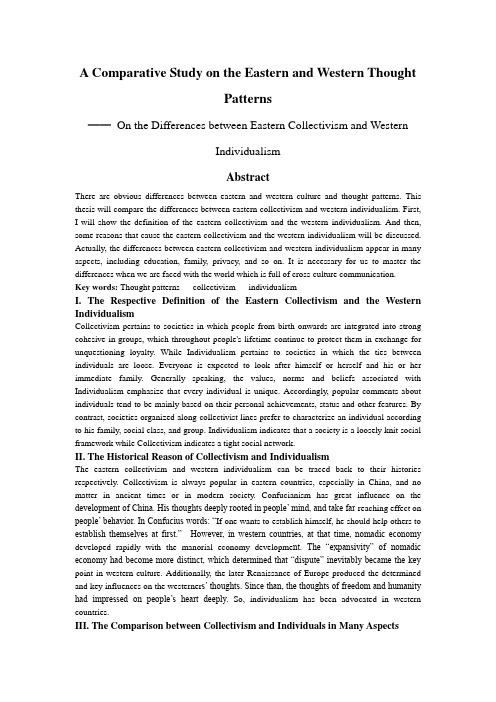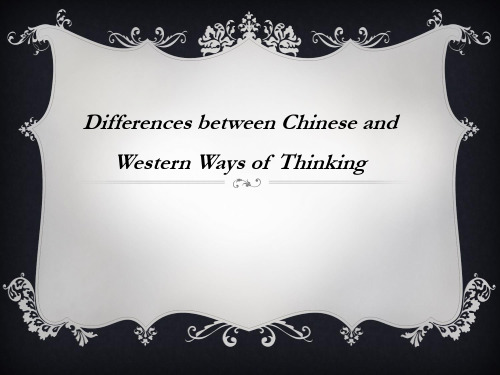Thinking Pattern East and West中西方思维方式 PPT
- 格式:ppt
- 大小:2.34 MB
- 文档页数:11

中西思维方式差异英语作文英文回答:In terms of thinking styles, there are indeed differences between the East and the West. One major difference lies in the emphasis on individualism versus collectivism. In Western cultures, individualism is highly valued, and people are encouraged to express their own opinions and pursue their own goals. This can be seen in the emphasis on personal freedom and independence. On the other hand, Eastern cultures tend to prioritize collectivism, where the needs and goals of the group are given more importance than individual desires. This can be seen in the strong sense of community and the emphasis on harmonious relationships.Another difference is the approach to problem-solving. Western thinking tends to be more analytical and logical, focusing on breaking down complex issues into smaller parts and finding rational solutions. This can be seen in thescientific method and the emphasis on critical thinking. In contrast, Eastern thinking tends to be more holistic and intuitive, taking into account various factors and considering the bigger picture. This can be seen in practices such as traditional Chinese medicine, which emphasizes the balance of Yin and Yang.Furthermore, there are also differences in communication styles. Western cultures tend to be more direct and explicit in their communication, often stating their opinions and intentions clearly. This can be seen in phrases like "I think" or "I want." In contrast, Eastern cultures tend to be more indirect and implicit, using subtle cues and non-verbal communication to convey their messages. This can be seen in phrases like "Maybe" or "It would be nice if."To sum up, the differences in thinking styles between the East and the West can be attributed to cultural values and historical influences. While Western thinking emphasizes individualism, analytical thinking, and direct communication, Eastern thinking prioritizes collectivism,holistic thinking, and indirect communication.中文回答:中西思维方式的差异确实存在。

东西方思维方法的差异东西方思维方法的差异主要表达在辩证思维与逻辑思维上:学者们常常用辩证思维来描述东方人,尤其是中国人的思维方法;用逻辑思维或者分析思维来描述西方人,尤其是欧美人的思维方法。
在他们看来,中国人的辩证思维包含着三个原理:变化论、矛盾论及中和论。
变化论认为世界永远处于变化之中,没有永恒的对与错;矛盾论则认为万事万物都是由对立面构成的矛盾统一体,没有矛盾就没有事物本身;中和论则表达在中庸之道上,认为任何事物都存在着适度的合理性。
对中国人来说,“中庸之道〞经过数千年的历史积淀,甚至内化成了自己的性格特征。
与中国人的辩证思维不同,西方人的思维是一种逻辑思维。
这种思维强调世界的同一性、非矛盾性和排中性。
同一性认为事物的本质不会发生变化,一个事物永远是它自己;非矛盾性信任一个命题不可能同时对或错;排中性强调一个事物要么对,要么错,无中间性。
西方人的思维方法也叫分析思维,他们在考虑问题的时候不像中国人那样追求折衷与和谐,而是喜欢从一个整体中把事物别离出来,对事物的本质特性进行逻辑分析。
正是因为思维方法取向的不同,在不少情况下,东方人和西方人在对人的行为归因上往往正好相反:美国人强调个人的作用,而中国人强调环境和他人的作用。
1.整体性和个体性中西方文化的开展有着各自的轨迹:中国文化建立在深受儒教和道教影响的东方传统之上,在思维方法上以辩证和整体思维为主要特征。
而西方文明建立在古希腊的传统之上,在思维方法上以逻辑和个体思维为特征。
中国人的整体观念根源于对自然界的朴素认识,按照自然界的本来面目把它当作一个整体来观察。
人与自然,个体与社会不可分割,互相影响,互相对应,把一切都放在关系网中从整体上综合考察其有机联系。
这种整体性和综合性,其渊源可追溯到《周易》。
《周易》以代表大地天地二卦作为起始,将象征万事万物的其余六十四卦置于其后,以天地位准则,将天地间的道理普遍包容在内,从整体上把握宇宙和万事万物,形成了概括天地间的世界体系,表达了一种系统的整体观。

A Comparative Study on the Eastern and Western ThoughtPatterns——On the Differences between Eastern Collectivism and WesternIndividualismAbstractThere are obvious differences between eastern and western culture and thought patterns. This thesis will compare the differences between eastern collectivism and western individualism. First, I will show the definition of the eastern collectivism and the western individualism. And then, some reasons that cause the eastern collectivism and the western individualism will be discussed. Actually, the differences between eastern collectivism and western individualism appear in many aspects, including education, family, privacy, and so on. It is necessary for us to master the differences when we are faced with the world which is full of cross-culture communication.Key words: Thought patterns collectivism individualismI. The Respective Definition of the Eastern Collectivism and the Western IndividualismCollectivism pertains to societies in which people from birth onwards are integrated into strong cohesive in-groups, which throughout people's lifetime continue to protect them in exchange for unquestioning loyalty. While Individualism pertains to societies in which the ties between individuals are loose. Everyone is expected to look after himself or herself and his or her immediate family. Generally speaking, the values, norms and beliefs associated with Individualism emphasize that every individual is unique. Accordingly, popular comments about individuals tend to be mainly based on their personal achievements, status and other features. By contrast, societies organized along collectivist lines prefer to characterize an individual according to his family, social class, and group. Individualism indicates that a society is a loosely knit social framework while Collectivism indicates a tight social network.II. The Historical Reason of Collectivism and IndividualismThe eastern collectivism and western individualism can be traced back to their histories respectively. Collectivism is always popular in eastern countries, especially in China, and no matter in ancient times or in modern society. Confucianism has great influence on the development of China. His thoughts deeply rooted in people’ mind, and take far-reaching effect on people’ behavior. In Confucius words: “If one wants to establish himself, he should help others to establish themselves at first.” However, in western countries, at that time, nomadic economy developed rapidly with the manorial economy developme nt. The “expansivity” of nomadic economy had become more distinct, which determined that “dispute” inevitably became the key point in western culture. Additionally, the later Renaissance of Europe produced the determined and key influences on the westerner s’ thoughts. Since than, the thoughts of freedom and humanity had impressed on people’s heart deeply. So, individualism has been advocated in western countries.III. The Comparison between Collectivism and Individuals in Many AspectsA.Collectivism and Individualism in terms of EducationIn Chinese education pattern, our parents and teachers told us that we should learn to collaborate with our companies. If we act like that, we will find it easy to finish our tasks. But if we don’t act like that, we will find it difficult to handle the problems. However, people in western countries tend to believe that people should rely on themselves as much as possible, and they usually expect other people to do the same. They are told that they must finish a task by themselves without others’ help. They have an open environment of them own. So when they are faced with problem, they are bound to handle it on their own first instead of asking others for help. They have a sense of individual thinking.B.Collectivism and Individualism in terms of FamilyTake china as an example. Compared to western countries, the divorce rate in China remains at a low level and much lower than that in western countries. Chinese care more about the unity of their families and the relationship of relatives. Besides, in China, there is a common phenomenon that “four generations under one roof”. The children are expected to stay at the parents .As the proverb says “the fallen leaves return to the root” .But in western countries, usually children move out of the parents house by age 20-22. If parents pressure their grown children to continue living at home ,people may say that they are not allowing their children to grow up .And parents in America usually live by themselves rather than move in with their children .Even when one parent dies ,the other may live alone .Many elderly people eventually move to retirement communities or homes where support services are provided them, so they have fewer responsibilities and feel more secure and comfortable .A significant number of retirees move to south where the weather is warm throughout the year .The most popular state for retirees is Florida.C.Collectivism and Individualism in terms of PrivacyIn china, it is seemed to be common that your parents may look up your dairy or listen to your phone by keeping you in the dark in china. But in America, the parents will respect the children. When the young come into their own bedrooms, without their permission, their parents can not enter their bedrooms either. Compared to china, western countries pay much attention to privacy. Privacy is much respected in the United States in terms of social contacts and daily activities. Americans avoid asking questions concerning others’ income, age especially for women and some other sensitive issues when it seems not to be the appropriate time for raising such questions. For instance one won’t ask his friend’s marital or job-seeking developments when his friend is apparently in a very embarrassing or unpleasant mood. Right of Privacy is the right claimed by individuals to control the disclosure of personal information about themselves. It also covers people’s freedom to make their own decisions about their private lives in the face of government attempts to regulate behavior. The Constitution of the United States guarantees a number of privacy rights. The Fifth Amendment, for example, upholds the right to refuse to testify against oneself in a criminal case. The Fourth Amendment protects a person against unreasonable searches and seizures by government officials. The Supreme Court of the United States has ruled that the Constitution also protects privacy in certain matters relating to marriage, reproduction, birth control, family relationships, and child rearing and education. However, compared to the days in the past, Chinese sense of privacy has been increasing in recent years.D.Collectivism and Individualism in terms of warWhat are worth of being taken notice of soldier different attitudes towards surrender and people different attitudes towards prisoners of war from their countries. For an American, it is natural andunderstandable to yield when he fights to the bitter end and has no bullet .But for Chinese ,to lay down his arms and surrender seems more disgraced than to die ,especially when the enemies are from other countries. In history, countless national heroes at the critical moment of national development abandoned individual interest even disregarded their own lives and families to go through fire and water for the cardinal principle of national interest .The spirit rose and spread by them has adored generation after generation, which has finally been considered into the spiritual tower of Chinese. The patriotism spirit is the chore and soul of our nation.E. Rights of Collectivities and IndividualsIn west, the rights of individuals should not be subordinated to the needs of a larger group, or at least that individuals should have the right to decide for themselves whether to sacrifice their personal benefit for the sake of the group. American people feel that the best way to ensure the well-being of the group is to protect the rights of individuals. In contrast, people in east are generally more willing to accept the idea that individuals should sacrifice for the benefit of the group. When a group of people who comes from China and West make a decision, the Chinese will decide it by raising hands. There is a principle that the minority always subordinates to the majority. In this condition, Western people will make a decision what he want to make, despite of others minds.IV. ConclusionCollectivism and individualism based on different thought patterns have their own features. The differences between collectivism and individualism are related to different features of histories. In collective societies like China, a “we” consciousness prevails and identity is based on the social system. The individual is emotionally dependent on organizations and institutions. Individuals trust a group rather than themselves. They are accustomed to a group to help them make a decision, complete his goal and enhance his confidence. In thought patterns that tend toward individualism, like America, an “I” consciousness prevails and competition rather than cooperation is encouraged. Personal goals take precedence over group goals. people tend not to be emotionally dependent on organizations and institutions, and every individual has the right to his or her private property, thoughts, and opinions. To conclusion, being familiar with the different thought patterns in east and west will benefit us a lot in cross-culture communication.Bibliography:[1] 胡文仲.跨文化交际学概论[M].外语教学与研究出版社.1999[2] 高晨阳.中国传统思维方式研究[M].山东大学出版.1998[3] 林大津.跨文化交际研究与英美人交往指南[J].福建人民出版社.2008[4] 许光华.中国文化概要[M].汉语大词典出版.2002[5] Larry A.Samovar, Richard E.Porter. Communication Between Cultures. 1995[6] Linell Davis. Doing Culture –Cross-cultural Communication in Action. 外语教学与研究出版社.2001。



孙二喜的转帖┊孙二喜的首页思维方式是思维活动的形式、框架、模式或类型。
思维方式理解为在一定条件下,思考问题的相对稳定的思维结构、思维方法、思维习惯、思维程序、思维定势等构成的思维运行模式的总和。
东西方思维方式的差异主要体现在辩证思维与逻辑思维上:学者们常常用辩证思维来描述东方人,尤其是中国人的思维方式;用逻辑思维或者分析思维来描述西方人,尤其是欧美人的思维方式。
西方人的思维是一种逻辑思维。
这种思维强调世界的同一性、非矛盾性和排中性。
同一性认为事物的本质不会发生变化,一个事物永远是它自己;非矛盾性相信一个命题不可能同时对或错;排中性强调一个事物要么对,要么错,无中间性。
西方人的思维方式也叫分析思维,他们在考虑问题的时候不像中国人那样追求折衷与和谐,而是喜欢从一个整体中把事物分离出来,对事物的本质特性进行逻辑分析。
西方的思维方式何以为今日之态,与西方哲学的发展是分不开的。
西方哲学起源于古希腊,经历过古希腊哲学、基督教哲学、近代哲学、现代哲学等阶段,它的特点决定了西方思维方式。
西方哲学承继了古希腊的哲学精神——都表现为对各种现象之后的原因的关注和对确定性的追求,因而,西方人的思维以科学为标准;西方哲学强调理性认知,因此,西方人擅长理性逻辑思维,其思维轨迹是直线的,而其思维模式也是多元的;在人与自然的关系上,西方哲学主张人应是主体,自然是客体,是人类认识和征服的对象,人类可以通过自身的能力认识自然,进而改造自然,因此,西方人更注重个体。
西方的思维方式还与科技革命有关。
科技革命引发了人们的思维方式的变革;思维方式的变革也有助于科技的发展。
西方的科学发展经历了四个阶段,而思维方式,在科技革命的影响下,也随之变革,从而形成了相应的思维方式。
从经验科学-认识自然界的现象中不但产生了古代经验科学,还衍生出直观和思辨的思维方式;从实验科学-认识必然性规律中,产生近代实验科学,同时,西方人还找到了实证和逻辑的思维方式;在理论科学-或然性规律中,产生现代理论自然科学,西方人更学会了概率和统计的思维方式;未来科学-非线形规律的诞生,又使西方人不但拥有耗散结构理论、自组织理论、混沌理论等未来科学,同时,开放性和非线性的思维方式也随之产生。